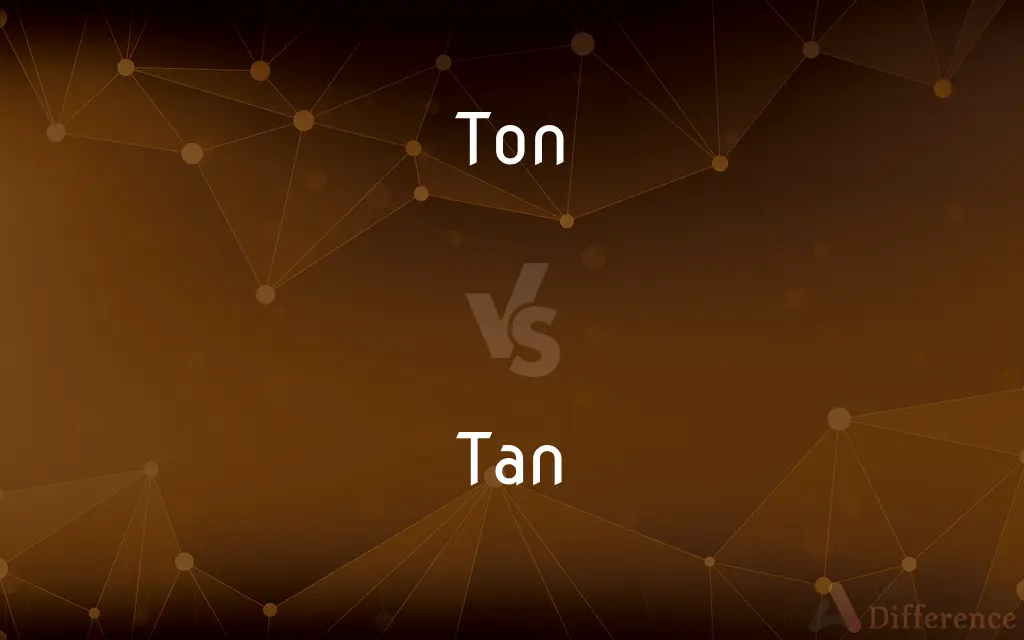Ton vs. Tan — What's the Difference?
By Maham Liaqat & Urooj Arif — Updated on March 26, 2024
Ton refers to a unit of weight, while Tan is a color or the process of becoming sun-kissed.

Difference Between Ton and Tan
Table of Contents
ADVERTISEMENT
Key Differences
A "ton" is a unit of measurement used to quantify mass or weight. In the United States, a ton equals 2,000 pounds, known as the short ton. In contrast, "tan" refers to a color shade that varies from light to moderate brown or to the process of skin darkening after exposure to the sun. Tan can also describe the act of turning animal skin into leather.
The term "ton" is widely used in various contexts, from shipping to describing large quantities of materials, highlighting its versatility as a measure of weight. Meanwhile, "tan" is a versatile term in its own right, describing not only a process and its result in terms of skin color but also a specific hue used in fashion and design.
In terms of linguistic use, "ton" is primarily used in technical, industrial, and commercial contexts. It quantifies heavy weights and large quantities, emphasizing its function as a precise measurement. On the other hand, "tan" finds usage in everyday language to describe skin color changes due to sun exposure, aesthetic preferences in colors, and the process of making leather, illustrating its broader, more varied application.
While "ton" represents a standardized measurement with specific international variations (such as the metric ton, equal to 2,204.62 pounds, and the long ton, used in the UK, equal to 2,240 pounds), "tan" can describe a range of hues from very light to deep brown. The specific shade of tan can vary greatly depending on context, such as fashion, design, or individual skin tone after sun exposure.
The use of "ton" is crucial in industries where heavy materials are transported, sold, or processed, requiring accurate weight measurements for pricing, logistics, and regulations. In contrast, "tan" plays a significant role in personal care, fashion, and interior design, where color and aesthetic appeal are key factors.
ADVERTISEMENT
Comparison Chart
Definition
A unit of weight or mass.
A color shade or skin darkening process.
Usage Context
Technical, industrial, commercial
Everyday language, fashion, design
Measurement
2,000 lbs (short ton) in the US
Varies in shade
Application
Quantifying heavy weights
Describing color and skin changes
Variations
Short ton, long ton, metric ton
Light brown to deep brown shades
Compare with Definitions
Ton
A unit of weight measurement.
The bridge can support up to 50 tons of weight.
Tan
A shade of brown.
She chose a tan color for the living room walls.
Ton
Used to describe large quantities.
They ordered a ton of concrete for the new building.
Tan
The process of skin darkening by the sun.
He got a tan after a week at the beach.
Ton
Long ton (2,240 lbs) in the UK.
British ships measure their capacity in long tons.
Tan
The act of making leather.
The hide was tanned using traditional methods.
Ton
Metric ton (1,000 kilograms).
The shipment weighed 3 metric tons.
Tan
Relates to aesthetic and fashion.
A tan is considered desirable by many for its sun-kissed look.
Ton
Short ton (2,000 lbs) in the US.
The cargo weighed in at 2 tons, requiring a sturdy truck.
Tan
Describes light to moderate brown colors.
Her tan dress matched her shoes perfectly.
Ton
The ton is a unit of measure. It has a long history and has acquired a number of meanings and uses over the years.
Tan
To convert (an animal hide) into leather by subjecting it to a chemical process that stabilizes the proteins, making it less susceptible to decay.
Ton
A unit of weight equal to 2,000 pounds (0.907 metric ton or 907.18 kilograms). Also called net ton, short ton.
Tan
To make (a person or a person's skin) darker by exposure to the sun.
Ton
A unit of weight equal to 2,240 pounds (1.016 metric tons or 1,016.05 kilograms). Also called long ton.
Tan
To make (a person or a person's skin) darker by exposure to artificial sunlight or by the application of certain chemicals, often in the form of sprays or lotions.
Ton
A metric ton. See Table at measurement.
Tan
(Informal) To thrash; beat.
Ton
A unit of capacity for cargo in maritime shipping, normally estimated at 40 cubic feet.
Tan
To become darker from exposure to the sun or artificial sunlight, or from the application of certain chemicals.
Ton
A unit of internal capacity of a ship equal to 100 cubic feet.
Tan
A light or moderate yellowish brown to brownish orange.
Ton
A unit for measuring the displacement of ships, equal to 35 cubic feet, and supposed to equal the volume taken by a long ton of seawater.
Tan
A suntan.
Ton
A large extent, amount, or number
Has a ton of work.
Gets tons of fan mail.
Tan
An artificially created suntan.
Ton
Used adverbially with a or in the plural to mean "to a great degree or extent" or "frequently"
Felt a ton better.
Has seen her tons lately.
Tan
Tanbark.
Ton
A unit of weight (mass) equal to 2240 pounds (a long ton) or 2000 pounds (a short ton) or 1000 kilograms (a metric ton).
Tan
Tannin.
Ton
A unit of volume; register ton.
Tan
A solution derived from tannin.
Ton
In refrigeration and air conditioning, a unit of thermal power defined as 12,000 BTU/h (about 3.514 kW or 3024 kcal/h), originally the rate of cooling provided by uniform isothermal melting of one short ton of ice per day at 32 °F (0 °C).
Tan
See Tanka.
Ton
A large amount.
I’ve got a ton of work to do.
I've got tons of work to do.
Tan
Light or moderate yellowish-brown to brownish-orange.
Ton
(slang) A speed of 100 mph.
Tan
Having a suntan or the appearance of a suntan.
Ton
One hundred pounds sterling.
Tan
Used in or relating to tanning.
Ton
(cricket) One hundred runs.
Tan
A yellowish-brown colour.
Ton
One hundred points scored.
Tan
A darkening of the skin resulting from exposure to sunlight or similar light sources.
She still has a tan from her vacation in Mexico.
I'm hoping to get a tan this weekend at the beach.
Ton
Fashion, the current style, the vogue.
Tan
The bark of an oak or other tree from which tannic acid is obtained.
Ton
Fashionable society; those in style.
Tan
An Armenian drink made of yoghurt and water similar to airan and doogh
Ton
The common tunny, or horse mackerel.
Tan
Syn of picul, particularly in Cantonese contexts.
Ton
The prevailing fashion or mode; vogue; as, things of ton.
If our people of ton are selfish, at any rate they show they are selfish.
Tan
(dialectal) A twig or small switch.
Ton
A measure of weight or quantity.
Tan
Yellowish-brown.
Mine is the white car parked next to the tan pickup truck.
Ton
The weight of twenty hundredweight.
Tan
Having dark skin as a result of exposure to the sun or an artificial process intended to mimic this effect.
You’re looking very tan this week.
Ton
Forty cubic feet of space, being the unit of measurement of the burden, or carrying capacity, of a vessel; as a vessel of 300 tons burden.
Tan
To change to a tan colour due to exposure to the sun.
No matter how long I stay out in the sun, I never tan, though I do burn.
Ton
A certain weight or quantity of merchandise, with reference to transportation as freight; as, six hundred weight of ship bread in casks, seven hundred weight in bags, eight hundred weight in bulk; ten bushels of potatoes; eight sacks, or ten barrels, of flour; forty cubic feet of rough, or fifty cubic feet of hewn, timber, etc.
Tan
To change an animal hide into leather by soaking it in tannic acid. To work as a tanner.
Ton
A United States unit of weight equivalent to 2000 pounds
Tan
To spank or beat.
Ton
A British unit of weight equivalent to 2240 pounds
Tan
To kill by gun, to shoot.
Tan
The second cardinal number two, formerly used in Celtic areas, especially Cumbria and parts of Yorkshire, for counting sheep, and stitches in knitting.
Tan
See Picul.
Tan
The bark of the oak, and some other trees, bruised and broken by a mill, for tanning hides; - so called both before and after it has been used. Called also tan bark.
Tan
A yellowish-brown color, like that of tan.
Tan
A brown color imparted to the skin by exposure to the sun; as, hands covered with tan.
Tan
Of the color of tan; yellowish-brown.
Tan
To convert (the skin of an animal) into leather, as by usual process of steeping it in an infusion of oak or some other bark, whereby it is impregnated with tannin, or tannic acid (which exists in several species of bark), and is thus rendered firm, durable, and in some degree impervious to water.
Tan
To make brown; to imbrown, as by exposure to the rays of the sun; as, to tan the skin.
Tan
To thrash or beat; to flog; to switch; as, to tan a disobedient child's hide.
Tan
To get or become tanned.
Tan
A browning of the skin resulting from exposure to the rays of the sun
Tan
A light brown
Tan
Ratio of the opposite to the adjacent side of a right-angled triangle
Tan
Treat skins and hides with tannic acid so as to convert them into leather
Tan
Get a tan, from wind or sun
Tan
Of a light yellowish-brown color
Common Curiosities
Why are there different types of tons?
Different types of tons, like the short ton, long ton, and metric ton, exist due to historical and regional measurement standards.
What factors affect the shade of tan on skin?
The shade of tan can depend on skin type, the amount of sun exposure, and individual melanin levels.
What is the difference between a ton and a metric ton?
A ton typically refers to the short ton (2,000 lbs) in the US, while a metric ton equals 1,000 kilograms (2,204.62 lbs).
Can the color tan vary in shade?
Yes, tan can range from very light to deep brown, depending on the context or specific use.
Are all tans the same in terms of leather quality?
No, the quality of tanned leather can vary based on the tanning process and the quality of the hide.
Can everyone achieve the same tan shade?
No, individual skin types and genetics determine how skin reacts to sun exposure.
Is tan only related to skin color?
No, tan also refers to a color shade used in fashion and design, as well as the process of making leather.
Can "ton" be used figuratively?
Yes, "ton" can be used figuratively to express a large amount of something, e.g., "a ton of work."
How do industrial sectors use the ton measurement?
Industries use tons to measure and transport materials like coal, metal, and grain efficiently.
How do you tan leather?
Tanning leather involves treating animal skins with tannins and other chemicals to produce durable, flexible material.
Is getting a tan healthy?
While many desire a tan for aesthetic reasons, excessive sun exposure can increase the risk of skin damage and cancer.
What's the significance of "ton" in recipes or cooking?
While not commonly used in cooking, "ton" could figuratively describe a large quantity of ingredients.
What's the environmental impact of tanning leather?
Traditional tanning methods can have significant environmental impacts due to the use of chemicals and water.
How is the term "ton" used in shipping?
In shipping, the ton is used to measure the weight or volume of cargo.
Is the tan color trend affected by seasons?
Yes, tan colors in fashion and design often become more popular in summer and fall.
Share Your Discovery

Previous Comparison
Denominator vs. Divisor
Next Comparison
Infuse vs. SuffuseAuthor Spotlight
Written by
Maham LiaqatCo-written by
Urooj ArifUrooj is a skilled content writer at Ask Difference, known for her exceptional ability to simplify complex topics into engaging and informative content. With a passion for research and a flair for clear, concise writing, she consistently delivers articles that resonate with our diverse audience.
















































